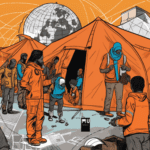
Fede: Welcome to another episode of “Data Politics at DataTunnel.” I’m your host, Fede, and joining me today are my co-hosts Val and Alan. Today, we’re discussing the crucial role of data in addressing the global refugee crisis, exploring both the solutions and challenges that data-driven approaches bring to this pressing issue. Remember, as the famous anthropologist Margaret Mead once said, “Never doubt that a small group of thoughtful, committed citizens can change the world; indeed, it’s the only thing that ever has.”

Data and the Global Refugee Crisis
Val: That’s a great quote, Fede, and it’s particularly relevant when we talk about the refugee crisis. As we know, millions of people have been forcibly displaced from their homes due to conflict, persecution, and other crises. Using data effectively can help us better understand the scale and complexity of the problem, and design more targeted and effective solutions.
Alan: Absolutely, Val. Data can also help us understand the human stories behind the numbers, making it easier for policymakers, humanitarian organizations, and the public to empathize with the struggles of refugees and displaced persons.
Understanding the Scope of the Crisis through Data
Fede: To begin, let’s talk about how data can help us understand the scope of the refugee crisis. Val, can you give us some insights into the current global situation?
Val: Certainly, Fede. According to the United Nations High Commissioner for Refugees (UNHCR), there were 82.4 million forcibly displaced people worldwide at the end of 2020. This number includes refugees, internally displaced persons, and asylum-seekers. Data from the UNHCR and other organizations can help us track trends, identify hotspots, and monitor the ongoing situation in various regions.
Alan: That’s an important point, Val. By analyzing this data, we can also identify the factors driving displacement, such as conflict, climate change, or economic instability. This information can be invaluable in informing policy decisions and humanitarian efforts.
Leveraging Data-Driven Solutions
Fede: Let’s move on to discuss some of the data-driven solutions that have been developed to address the refugee crisis. Val, can you share some examples?
Val: Sure, Fede. One interesting example is the use of predictive analytics to forecast displacement patterns. By analyzing data on conflict, weather, and other factors, organizations can anticipate where large-scale displacements are likely to occur, allowing them to respond more effectively.
Alan: That’s a great example, Val. Another area where data-driven solutions have been employed is in improving access to education for refugee children. By using data to identify gaps in educational services and better understand the needs of displaced children, humanitarian organizations can design targeted interventions to ensure that these children have access to quality education.
Challenges and Ethical Considerations
Fede: Of course, as with any data-driven approach, there are challenges and ethical considerations that must be taken into account when using data to address the refugee crisis. Alan, can you tell us more about this aspect?
Alan: Certainly, Fede. One major challenge is ensuring the privacy and security of the data collected from refugees and displaced persons. This is particularly important given the sensitive nature of the information and the potential risks to individuals if their data were to be misused.
Val: Additionally, it’s crucial to be mindful of the potential biases in the data we collect and analyze. Incomplete or inaccurate data can lead to flawed conclusions and misguided interventions. We must always strive to ensure that our data-driven approaches are as accurate, inclusive, and unbiased as possible.
Fede: Well said, Val and Alan. It’s clear that while data holds immense potential for improving our understanding of and response to the global refugee crisis, we must also navigate the challenges and ethical considerations that arise in using this data. As we work to develop data-driven solutions, it’s essential to keep the human stories and experiences at the heart of our efforts.
Looking Forward: The Role of Data in Shaping Future Policies
Fede: As we wrap up today’s discussion, let’s take a moment to look forward and consider how data might shape future policies related to the refugee crisis. Alan, what are your thoughts on this?
Alan: I think one of the most significant potential contributions of data to future policies is in helping us better understand the long-term impacts of displacement on both refugees and host communities. This understanding can inform more sustainable, equitable, and effective policies for refugee resettlement and integration.
Val: I agree, Alan. Another important area where data can inform future policies is in the early identification and prevention of crises that lead to displacement. By using data to identify and address the root causes of forced migration, we can work towards a more proactive and preventative approach to the refugee crisis.
Final Thoughts
Fede: Absolutely, Val and Alan. As we continue to develop and refine our data-driven approaches to the refugee crisis, we must never lose sight of the human experiences behind the numbers. As we work together to address this global challenge, we must remember that, in the words of Margaret Mead, “a small group of thoughtful, committed citizens can change the world.”
Thank you, Val and Alan, for joining me today, and thank you to all our listeners for tuning in. Join us next time on “Data Politics at Datatunnel” as we continue exploring the intersections of data and politics in our world.